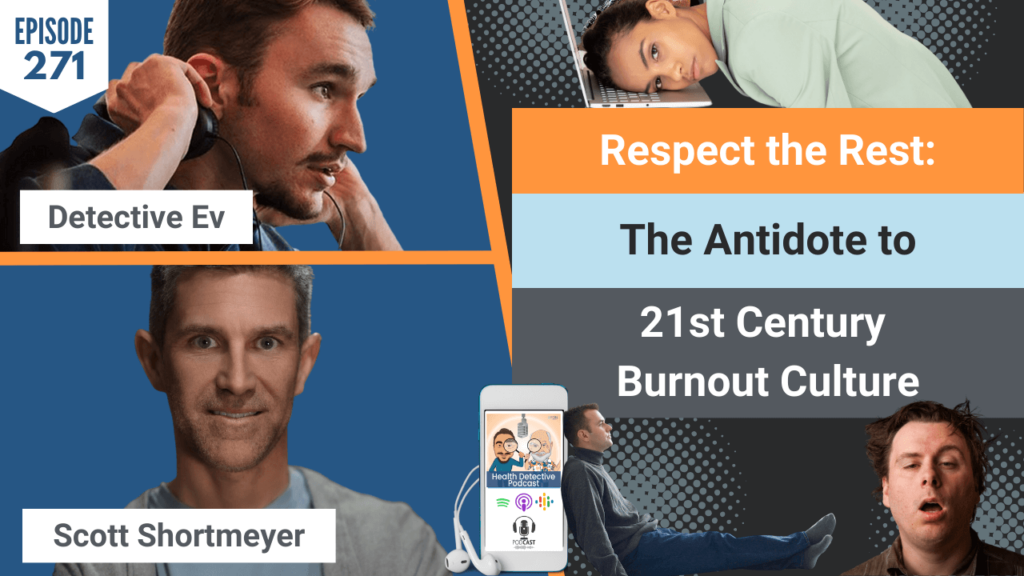Introduction
[00:00:00] Detective Ev: Hello, my friends. Welcome back to another episode of the Health Detective Podcast by Functional Diagnostic Nutrition. My name is Evan Transue, aka, Detective Ev. I will be your host for today’s show on how to respect the rest.
If you do not know me, never heard of me before clicking on the podcast for the first time, whatever it might be, I’m no one special in particular. I work at FDN, have my own FDN business, and do some public speaking for mostly students, but I’ve evolved into adults as well. However, I love speaking to students though. I’ll do that as long as they think I’m young enough to be able to do that.
I had seven different diagnosed health conditions at the age of 18. Basically, from 5 to 18, I got sicker and sicker. And I finally came to a conclusion that I needed to take my health into my own hands, not because I knew what I was doing, but because I knew Western medicine, through really no fault of their own, was not able to serve me in the way that I needed to be served.
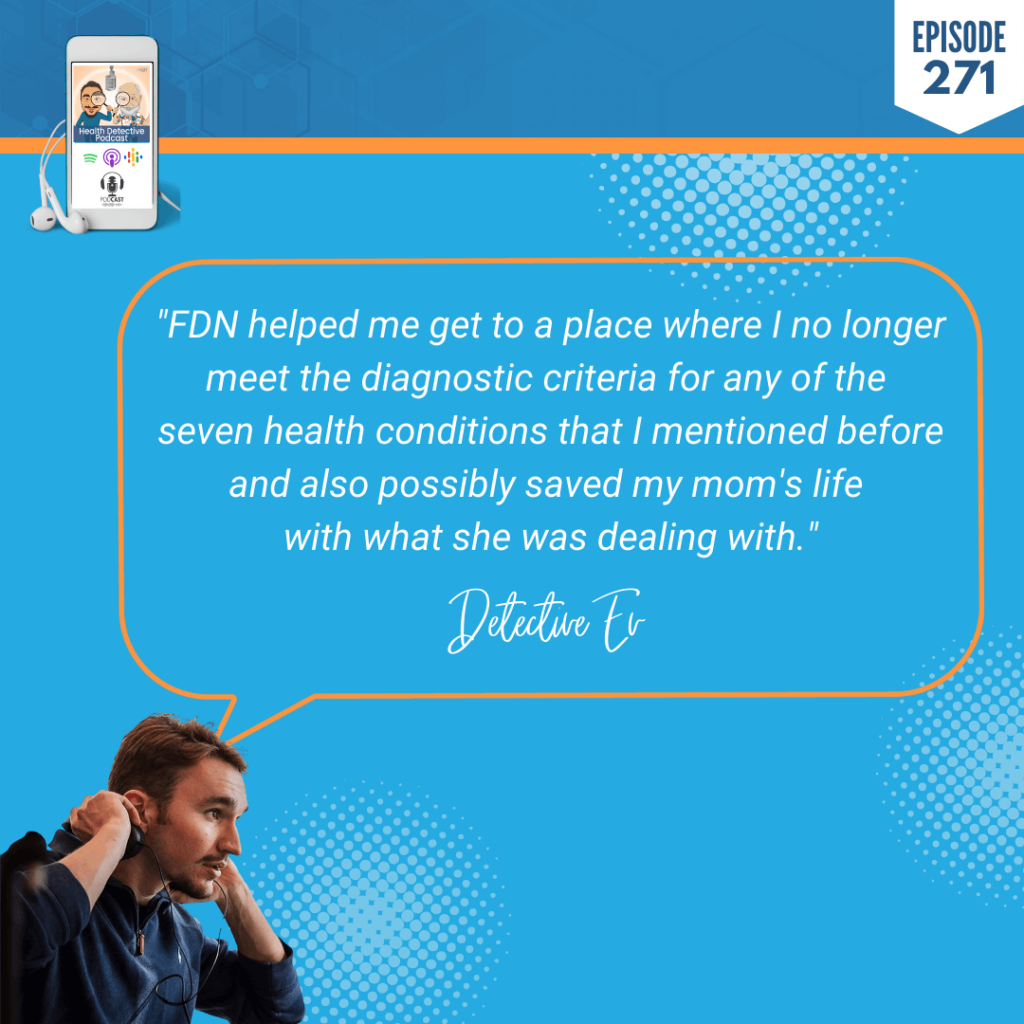
Fast forward all these years later and thank God I found the FDN program. Now they can’t get rid of me. FDN helped me get to a place where I no longer meet the diagnostic criteria for any of the seven health conditions that I mentioned before and also possibly saved my mom’s life with what she was dealing with. That’s why I’m here, that’s who I am, and I absolutely love what we do.
Live Podcasts
With that said, today we’re going to be interviewing a gentleman named Scott Shortmeyer. I got to meet him in Boston at a biohacking conference that we were having FDN at. And then Kimberly Boem, someone who’s been on the podcast before, she was speaking there representing FDN. Absolutely fantastic conference. Very small but it was a lot more intimate than most conferences where it’s a five-minute conversation and you’re done.
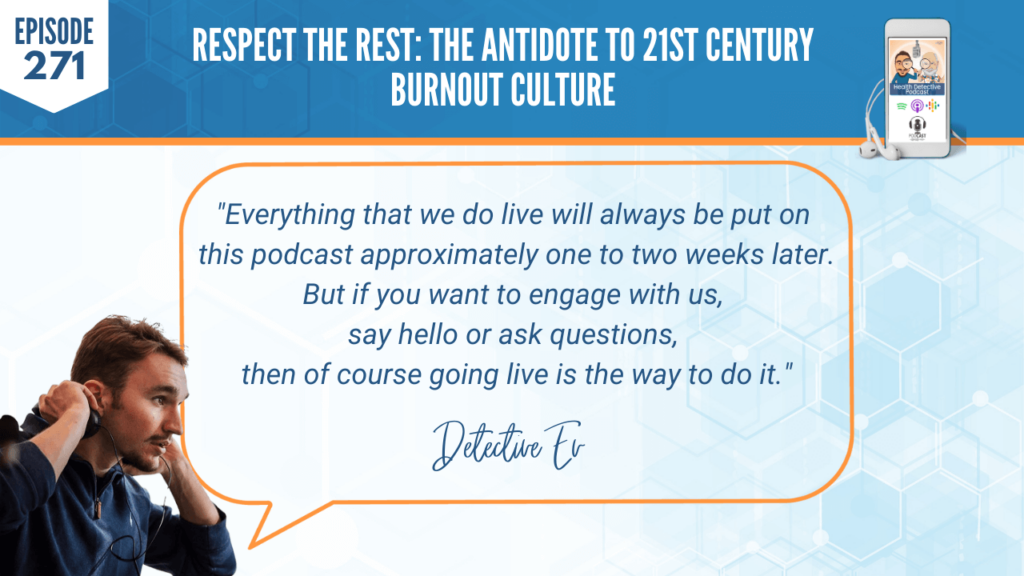
Today we are talking to Scott Shortmeyer. I’m not going to read his bio because I read the bio live and this is a recording from that. If you guys want to catch our podcast live, make sure you’re subscribed to us on YouTube. Check out our Facebook page and then we will be doing them on LinkedIn soon. Everything that we do live will always be put on this podcast approximately one to two weeks later. But if you want to engage with us, say hello or ask questions, then of course going live is the way to do it.
Without further ado, let’s get to today’s episode.
Hello everyone and welcome to another live episode of the Health Detective Podcast. I think we are on episode number 271, which is crazy. We’re very lucky, I just get to do this part and then we have a wonderful team as Scott just got to meet today. That’s how we’re able to do all these episodes.
But it’s great to be able to talk to you today, Scott. I do have your bio. I usually record these things first and then do that afterwards. But when we’re doing the live part, I think it’s important that I read the bio live in case anyone tunes in with us today.
Respect the Rest: Total Life Load
Scott is a husband of 20 years, father of three girls. He’s a 20 plus year sales leader, podcast host of the Rest and Recovery Podcast, longtime endurance athlete, coach, and turned FDNP with the goal to enable clients to thrive and live this one life. Other than the father part, it sounds like we got a lot in common here so I’m thinking this is going to be a good podcast.
Scott Shortmeyer: Awesome.
Detective Ev: Thanks for coming on with us today.
[00:04:54] Scott Shortmeyer: I appreciate the opportunity to chat with you, tell a little bit of my story, and the value of FDN that I’ve found as well.
[00:05:03] Detective Ev: And that’s what we’ll start with first.
I’d love to hear your story, when the symptoms began, because most people do not get into this space without having a personal story. Most men definitely do not get into this space without having a personal story and most sales type men do not get into the space, that’s for sure. We have a few variables against us and yet here we are. I’d love to hear about what was going on.
[00:05:25] Scott Shortmeyer: I did notice that I think we need a men’s group of FDN folks.

But yeah, I think my awareness came in my late thirties because of, in a word, burnout. You mentioned all the things of my personal life. I was doing all of those good things not wisely during my thirties and basically blew up. My hormones were a mess, went into depression for about two years at the end of my thirties, early forties. Really the root cause of that was not accounting for what I call my total life load of all the things in my life.
Respect the Rest: The Natural Path
My career was taking off at the beginning of my thirties. My family was growing. We had three kids in three years. And then I had the wise idea of getting back into running. I didn’t do 5k’s, I had to go do marathons and triathlons. So, I couldn’t go just the simple route.
During that timeframe, I was basically not getting sleep – four or five hours of broken sleep for nearly a decade – and it showed up. I just wasn’t being wise with all the things and accounting for the total life load of the stress and lack of sleep.
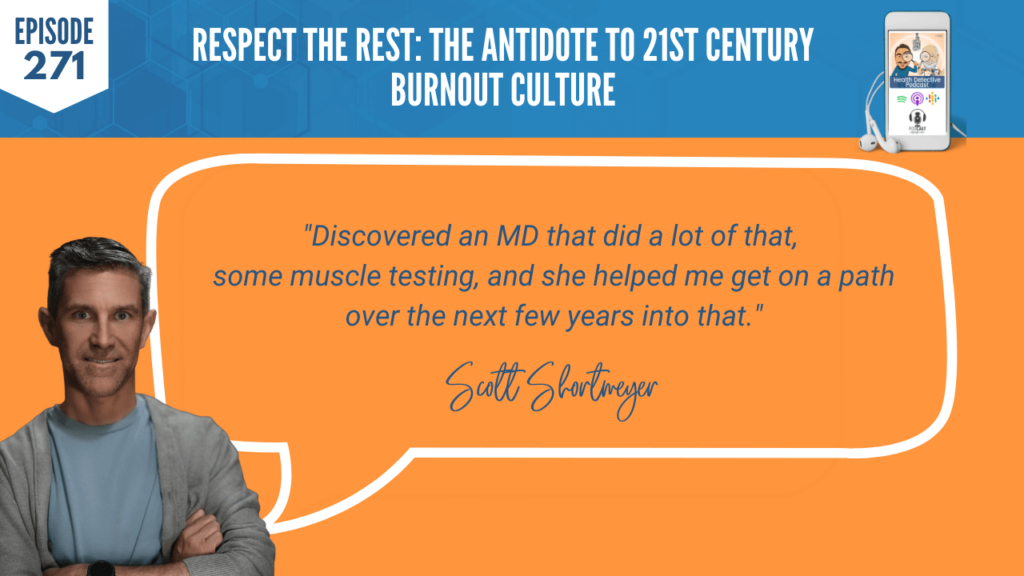
My testosterone was like 200 to 225 at that time. For all intents and purposes, that was a quote/unquote “athlete”, granted, an everyday athlete and I just went sideways. Learned about health from my wife. She was doing some things for our kids because of the food allergies that they were dealing with and started getting into more of the holistic health. Discovered an MD that did a lot of that, some muscle testing, and she helped me get on a path over the next few years into that.
[00:07:13] Detective Ev: Let’s be honest, and I don’t know your personal story, so maybe it was something you were very open to. You are aware at this point then that you have these problems, you know what’s going on, but now you have to make this transition into more natural things, especially muscle testing.
I’m not condemning that, by the way; I actually do believe in that. But for many people, that’s a stretch. That’s a huge paradigm shift to do something like that coming from Western medicine. So, was there any resistance on your end in the beginning trying to transition to natural?
Respect the Rest: Normalizing the Abnormal
[00:07:41] Scott Shortmeyer: Oh, yeah. You’re reading different things, especially reading herbs and the stereotypical things when it comes to holistic or natural, and some limiting mindset on my side, probably on what it can or cannot do.

I think ultimately what we now as FDNs face is that cultural shift of the sick care model and normalizing feeling mediocre and that, oh, it’s just normal. Were there valid things? Like I had kids and didn’t sleep, sure. But it’s not normal, however normalized it’s become.
Getting into the natural, it was definitely different. I didn’t go kicking and screaming, but I also wasn’t driving the bus. My wife was the big driver on a lot of that initially. Eventually I woke up and realized, you know what? She’s pretty smart so I should probably listen.
[00:08:33] Detective Ev: I don’t like stereotypes, but this one works very well in the world of functional medicine. Us guys are a little more reluctant to these types of things. And women just seem to have this really wonderful, beautiful, intuitive healing side. They just get this stuff a lot easier than us.
I can’t tell you how many people, Scott, I’ve interviewed on this podcast. So, I always say the number is 95%, it’s probably higher. But the amount of people that I’ve interviewed on this podcast, which largely has been women, say the reason they got into the natural side of things is I just knew; it was a gut feeling; it just didn’t make sense. So, it wasn’t something profound that happened. They just knew instinctually something’s not adding up here. They finally had their final straw and then they’re willing to go try some different things.
Respect the Rest: Focusing on Sleep
By the way, for those that don’t know, I’m assuming the range is offhand, I actually don’t myself. I wanted to test this recently. You said, I think your testosterone was about 200 to 225. What would be a good range for a male at that age?
[00:09:30] Scott Shortmeyer: Definitely not that. I would say at least double 500 or so, 600 would be my guess. I know the range from a medical model is like 200 to 1100 or something crazy from a range perspective. And yeah, I would say anything over 5 would be much healthier. Obviously, it depends on the person.
[00:09:54] Detective Ev: Just know if you’re low on Western medicine range, that’s usually not a great sign.
Okay, so you have this paradigm shift, you’re becoming very open to the natural side of things. You did mention some specific things, but I’m always curious. What was the first thing that really got the needle moving for you in terms of, wow, I’m starting to feel better, this is getting me results? Was it a dietary thing or fixing that dang sleep you had going on?
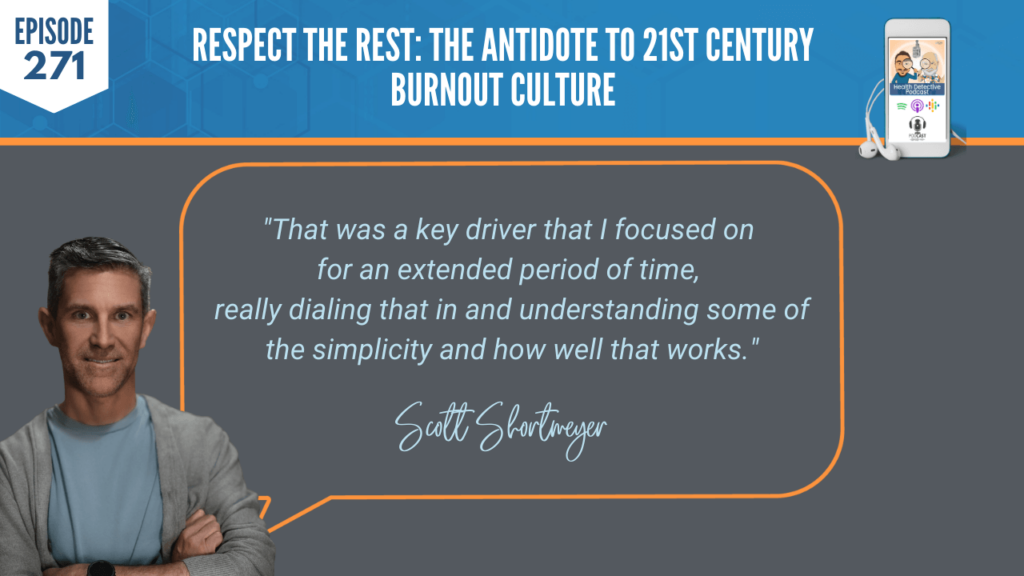
[00:10:15] Scott Shortmeyer: Yeah. It was really the sleep. That was a key driver that I focused on for an extended period of time, really dialing that in and understanding some of the simplicity and how well that works. It doesn’t have to be a pill or some fancy thing. I think sleep is just bookending your day and having some focused attention to it.
Respect the Rest: Self-Education
There were some habit changes that I probably was justifying staying up late because I earned it somehow, and justified the Netflix binge or whatever that compounded the negative spiral. But yes, sleep was definitely a huge one in realizing the cascade effect that has on your health and everything from hormones to physical recovery to whatever, mental state, especially.

So, I think that’s where I started to dive into it, started to do some research. I discovered some different people, the benefit of doing things like this, the social webs, and just doing some self-education and awareness really was a key driver.
[00:11:29] Detective Ev: Gotcha. I’m actually curious about one thing because I always like to know what was going through people’s heads at the time. I think that’s very relatable to the people that might be listening right now that are actively struggling.
You mentioned for almost a decade, you’re doing this 4 to 5 hours of sleep per night on average. And you almost viewed it as, I’m rewarding myself from things that I did during the day. Did you have any idea at the time that this wasn’t okay to be doing, because some people don’t get this? Many individuals are looking at four or five hours of sleep and they’re just thinking, as long as I can wake up and operate the next day, I’m fine.
Obviously, the body’s resilient, it can last for some period of time but not forever. So, did you even register this as something that was not going to work out permanently?
Respect the Rest: A Number of Reasons Why
[00:12:13] Scott Shortmeyer: No, definitely not at the time. And like you said, the famous words, I’m fine. And just because I was functioning doesn’t mean I was functional at all.
For a while it was a joke and it’s really not funny now. It’s actually pretty sad. I don’t remember my thirties. There’s literally gaps in my memory. Like, we’re sitting having family conversations with my wife about things we did with our kids. They’re telling me and I’m literally acting like I was not even in the universe. It’s just heartbreaking now because there’s only so much time we have with our kids. I’ve got three daughters and it’s just an omission that I can’t reclaim.
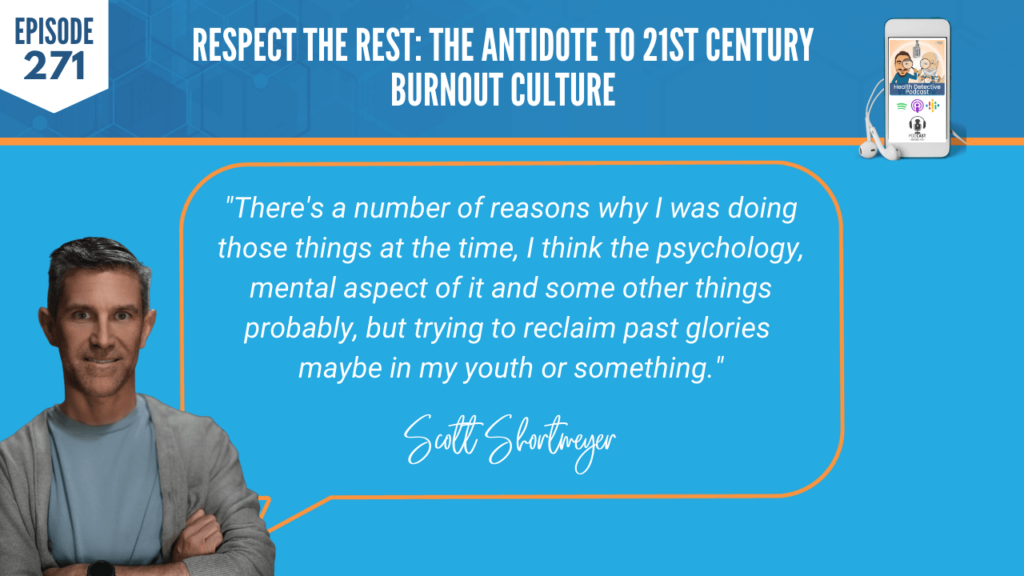
There’s a number of reasons why I was doing those things at the time, I think the psychology, mental aspect of it and some other things probably, but trying to reclaim past glories maybe in my youth or something.
[00:13:05] Detective Ev: I don’t recall anyone else ever actually describing it like that that I’ve interviewed, but I had a similar thing. Now, I always attributed it to being, when I was younger in high school, I had these mental health issues. I was abusing drugs as a result, and I always associated the lack of memory with that kind of stuff.
But looking back, I don’t know if it was that straightforward, because basically from 15 to 18 is this huge blur. And I wasn’t necessarily using drugs yet at 15, that started later in my life. And then that’s when things got really bad.
Respect the Rest: Becoming Aware
But I think, yeah, with that lack of sleep and the constant stress maybe your mind represses some of it, or you just can’t form these good memories. Cause we do know that part of REM sleep, for example, is forming memories from the day; it’s processing things. So, my gosh, if someone’s never sleeping, that actually makes a lot of sense that certain memories wouldn’t stick. And you’re right, it’s not funny.
I loved that last little bit of your bio. I don’t know if people caught that, but you talked about this one life to live. That’s something I’m really big on. You don’t want to be not remembering multiple years or a fricking decade of your life when it’s already incredibly short. I love the passion for that and I definitely get that.
Moving into the FDN thing then, we’ve already specified it’s one thing for us guys to get into this and be open to this, in this case, listen to the wife and say, okay, I need to do some of this. It’s a whole nother thing to say, I’m going to go and actually make this a career. I’m going to get the certification; I’m going to start a podcast.
What made you want to do FDN? How did you even find this?

[00:14:30] Scott Shortmeyer: It started with the podcast. I realized with the sleep piece, so many people I was having, I became aware, right? It’s that red car driving the street and all of a sudden you see red cars everywhere. And so suddenly I was like, I’m hearing in the conversations the normalization of sleep deprivation basically, and also the warrior badges of staying up late for the Netflix binges.
Respect the Rest: The Medical Director Program
I’m just hearing it more and then correlating how people felt. And I’m like, I got to dig into this more. Then I was like, I’m going to start a podcast, even if it’s just me learning. I’ll start talking and just having conversations because I’m smart enough to be curious, but maybe not the most brilliant guy. I was just a curious person.
Then I just kept investigating and decided I’m going to record these conversations and realized so many people are just friendly and want to have conversation to advocate health.
Then the Biohacking Congress, I know FDN is a pretty big partner with them. I discovered that through some of the folks I interviewed. Went to one as a media partner, actually saw Reed speak. I think it was October of ’21. We did a couple more events and then it was Boston where actually you and I crossed paths.
At that point, I was well into another year or so into really digging into this. Looked at other certifications that had the functional health space. When I learned more about FDN further and had conversations with you and Kimberly Boehm, who was there, she spoke and did a panel with her there, anyway, I just realized what FDN was.
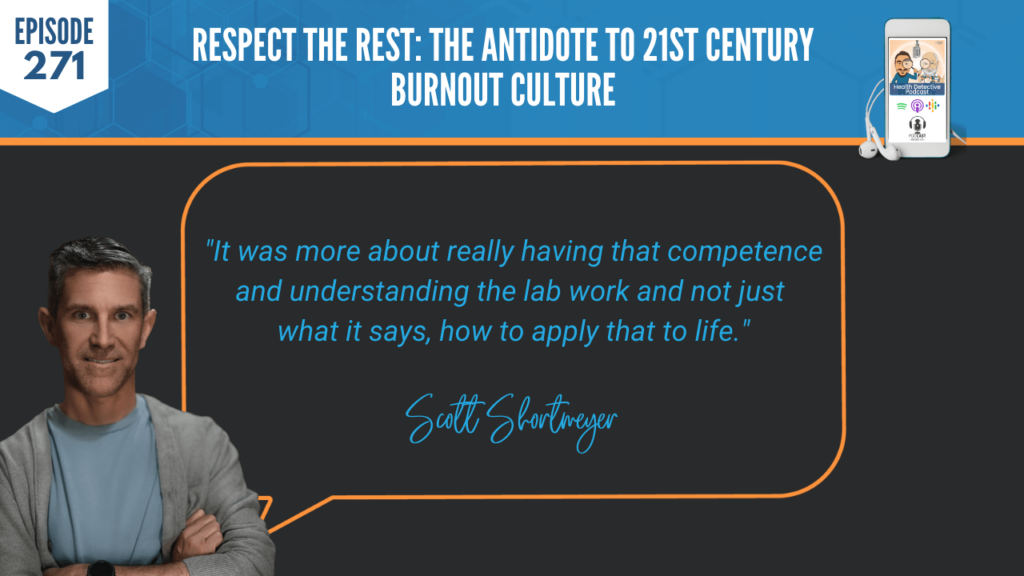
The key differentiator for me was that medical director program. It didn’t feel like just habit structures, which is critical, right? It’s really foundational, that lifestyle. We have the DRESS protocol. But it was more about really having that competence and understanding the lab work and not just what it says, how to apply that to life. Then having that reach back on the medical director program, I think was really for me the pivot.
Respect the Rest: We’re the Biohack
And I was like, all right, I’m doing this now. Because it didn’t even cross my mind the first year or so even though I was looking at these certifications. I was like, I’m doing this and signed up within, I think, two weeks.
[00:16:52] Detective Ev: I think this is the classic like sales DNA, right? Logical yet impulsive.
I totally get this because it was the labs too that resonated with me. Listen, I think both of us would acknowledge that the habit change and mindset aspects are very important. In fact, most people don’t realize this, salespeople are huge on this. Most sales companies are very big on training the mindset stuff. That’s like who the motivational speakers are built for are these sales teams out there. We’re all listening to tapes and reading books.
But there’s a certain time where we are logic oriented and we’re trying to get some objective data. We’re always tracking numbers. And I think the labs, that’s what appealed to me. I said, okay, I can stop just playing this subjective game of I think I’m feeling better, I think I’m doing okay, I think my skin’s a little clearer, to, all right, I did this and the numbers either got dramatically better, maybe a little bit better. So, it’s not anything huge or it got worse. I can start tracking this and make a science out of my own body.

And that’s what we actually understand at the Biohacking Congress is that we’re the biohack, that’s the science of the self. We’re using the labs to figure out what’s going on with us. So, that’s amazing.
Respect the Rest: Loving the Learning
I didn’t realize that you were at the October ’21 one though. That would make sense because Reed did speak there. I was there and Raewyn, his wife, was there. That was the first biohacking Congress I got to go to. It was really special; it was fun. A few hundred people running around there and definitely a fun, nerdy group for sure.
While you were saying this, the podcast actually preceded even the FDN certification. I guess once you got into this in terms of realizing what it could do for you, you seem to have very rapidly developed somewhat of a passion for this in terms of sharing this information with others and continuing learning about it, it seems, right?
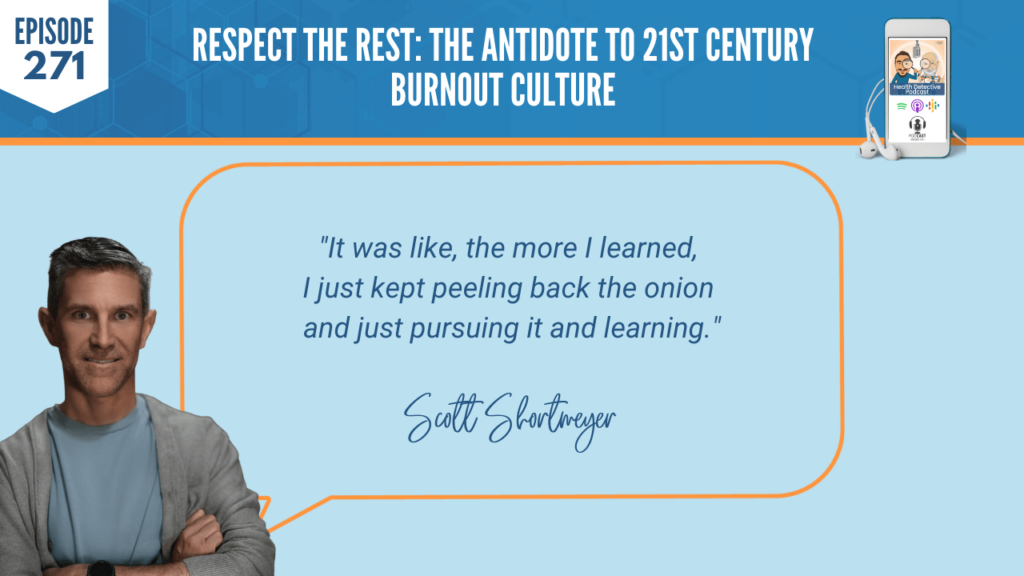
[00:18:32] Scott Shortmeyer: Yeah, absolutely. It was like, the more I learned, I just kept peeling back the onion and just pursuing it and learning. I didn’t know what biohacking was and so got curious about that.
I probably got a little ahead of myself too and was trying too many things too soon. But that’s part of you get bought into something and you just jump right in. And I think probably up to that point, I was probably an over-consumer of supplements anyway. Now I know how to be a little more prescriptive about it or wiser about the utilization.
But yeah, I just got really enthralled with it, enjoyed the conversation. And every conversation, I was learning something new about the body and how it functions and just, honestly, the wonder of it of how complex but at the same time, straightforward, I think that the body is and just amazed how one thing can cascade into a myriad of things, right?
Respect the Rest: The Reticular Activating System
It’s not just throw a pill at this thing and everything will be fine, that symptomatic model. It was really understanding the why and really digging into it, then again, attenuating my ear to hear things. And I think I’ve heard this in other FDN conversations of suddenly you’re diagnosing people in every conversation. Not diagnosing, we don’t diagnose, but just, that could be an issue, that’s probably what’s going on.
[00:20:06] Detective Ev: It’s bittersweet. You brought up that comparison of you want to buy a red car and you see the red car everywhere. I think many people actually have probably heard of this, I learned this from Tony Robbins years ago.
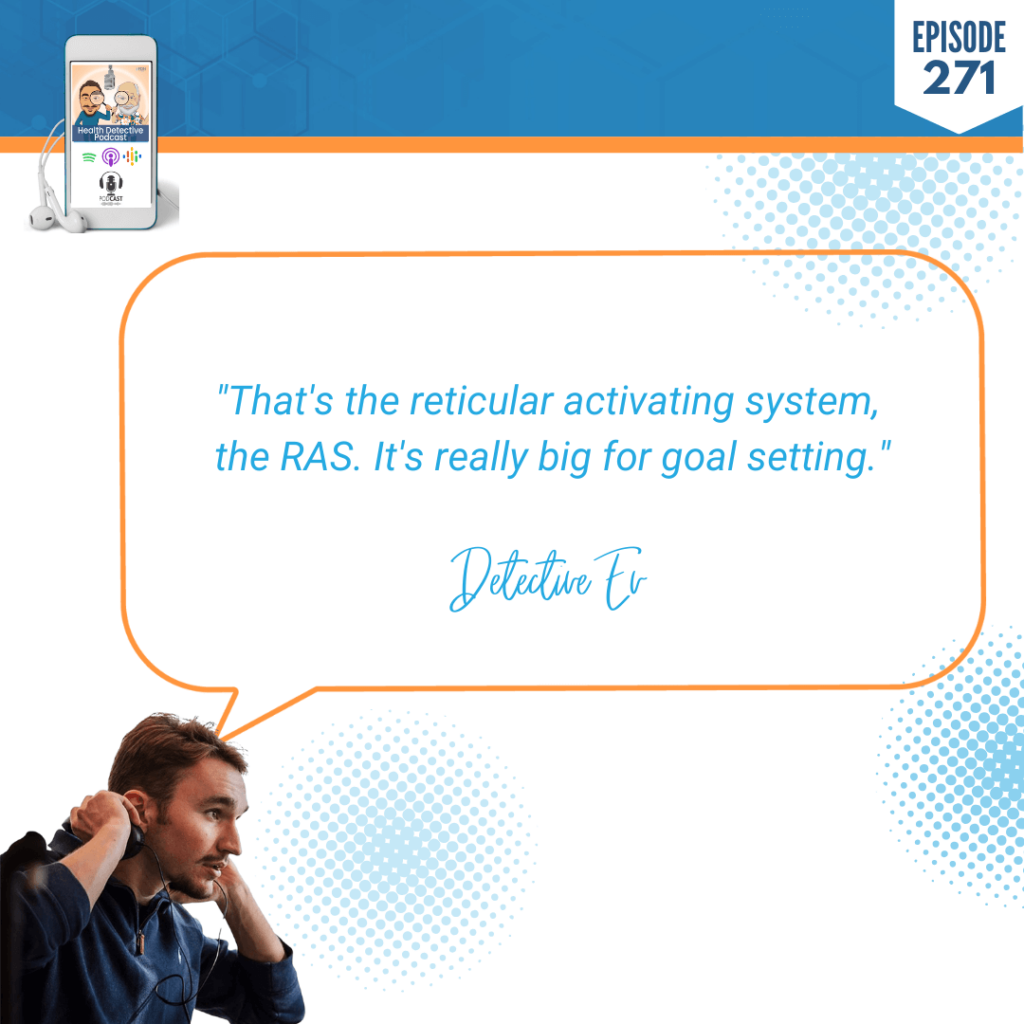
That’s the reticular activating system, the RAS. It’s really big for goal setting. That’s why they say set your goal on a specific amount of money or a specific outcome, because then you’ll start seeing these things. To me, that’s very practical, very real. It’s not just woo-woo.
If I wanted to make a hundred thousand dollars a year, and I set that goal, I’m going to start seeing things that are going to lead me to that opportunity. But similarly, the reason it’s bittersweet is because you can do that with very positive goals, but the second that you realize some of the sickness where you experience it yourself, you start to see it everywhere.
It’s amazing to me when I talk to certain family members or friends that otherwise respect what I do, they’re not being rude, but they’re like, do you really think this is that big of an issue? I’m like, I see it in you. They haven’t even caught it yet in themselves. We’re just trying to fight it out here on the front lines and help people out.
Respect the Rest: Shocking Results
When you were going through the FDN curriculum, one of the things that we include in the cost of tuition is our lab tests to run on yourself. Now you were already doing a lot of research. You seem like a very big doer, like you’re like, hey, I’m going to do what I have to do. So, you probably already felt a lot better by then. But I’m curious, what showed up on the labs for you that was maybe notable things to still work on even when you’re going through the course?
[00:21:31] Scott Shortmeyer: Yeah. And up to that point I was doing not traditional, little broader scope and biomarkers with blood work. But never did the stress and hormone profile and the other labs, the mucosal barrier.
I think the big one was, and it’s interesting the snapshot in time for the SHP, was my cortisol was completely tanked. Which when I think back at first, I wasn’t accounting for it. But I was in the midst of a very stressful time. I was training for a half marathon and then I was involved in a private matter, but it was intense that I was driving this resolution and I realized how I was stressed. It was personal and professional and so it was really intense. And I think it showed up in the lab for that.
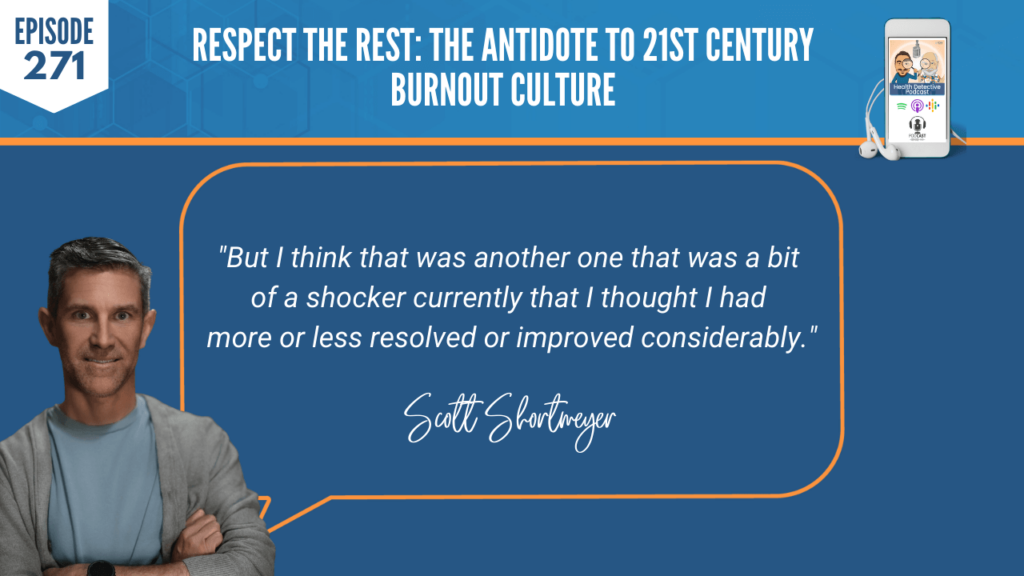
Then I was surprised on kind of the result on the GI MAP and the mucosal barrier. I’ve had stomach issues in the past probably related back to the over training and under recovered stuff. But I think that was another one that was a bit of a shocker currently that I thought I had more or less resolved or improved considerably. That just reawaken me to that.
Respect the Rest: Perception of Stress
I was like, oh, maybe I am thinking backwards again. Okay, maybe yeah, there are some indicator lights happening that I was ignoring, even though I’m bought in and aware. You help justify things or rationalize at times.
[00:23:00] Detective Ev: I love all the labs, obviously we all do. But the SHP, the stress and hormones profile, in particular is very useful. Because I think for those of us that require that objective data to really make huge changes in our lives, when I saw that too, and I saw that my stuff was tanked, it was like, wow. You realize the weight of the situation.
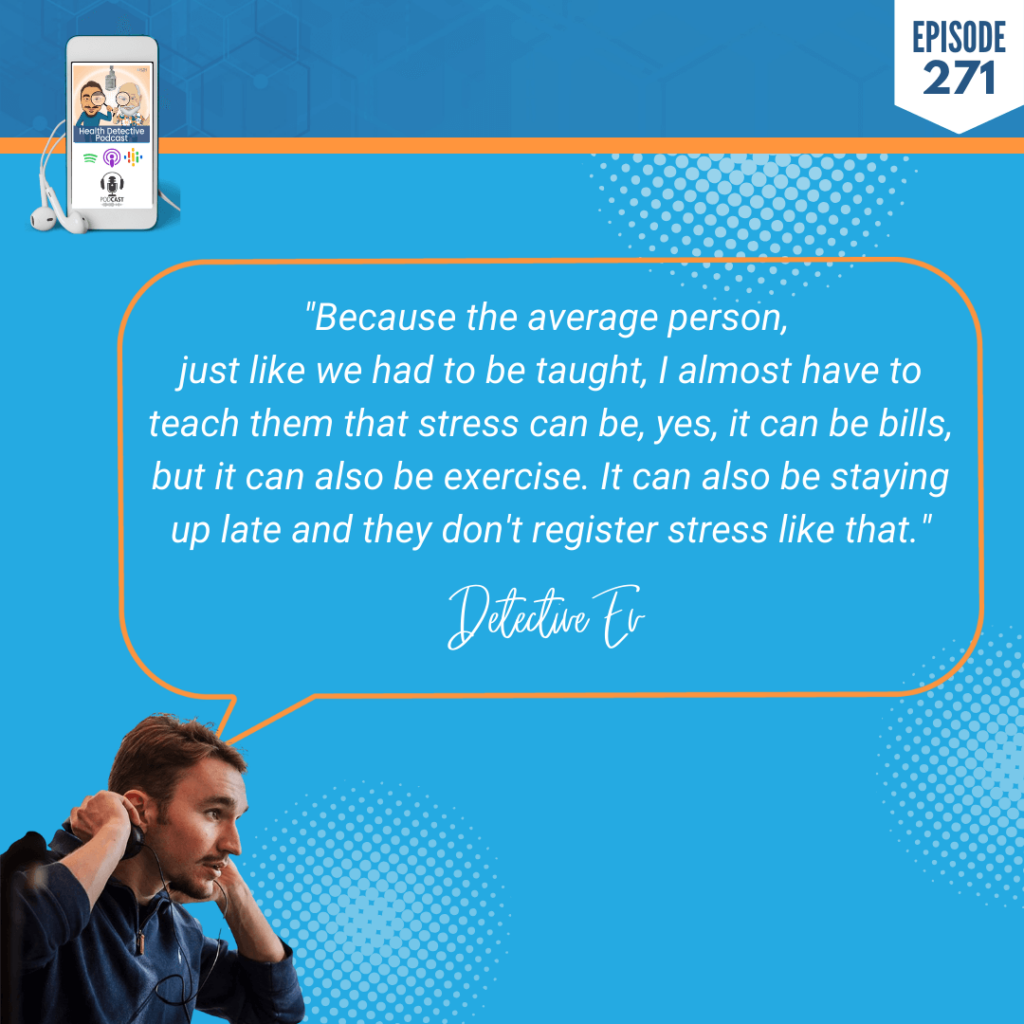
And you used a phrase in the beginning of this episode, you said “life load”. I love that. So, I always say stress. I don’t know if I’ve ever heard someone say it as “life load”. I think that’s more relatable for the average person. Because the average person, just like we had to be taught, I almost have to teach them that stress can be, yes, it can be bills, but it can also be exercise. It can also be staying up late and they don’t register stress like that.
They register stress as I’m late on bills or I’m fighting with a family member. It’s only a few things. When you word it as “life load”, I think that’s a lot more relatable in the sense of, okay, look at what you’re doing. Mr. and Mrs. So-and-So.
Respect the Rest: Getting Started
You wake up at six, at the gym by seven, there for a couple hours, working a nine to five, got the kids when you come home, stay up late on TV, and then you do it all over again. Would you have a high life load? I think most of us would say yes, but that’s how the majority of people are living to some degree. Crazy to think about.
What are you doing now because I only actually have a basic understanding of this? Are you practicing as an FDN? Is it just the podcast? Do you take clients? I’d love to learn more about that.
[00:24:23] Scott Shortmeyer: Yeah, I am a recent graduate. So, I’m in the process of onboarding clients. I do have a couple that we’re just starting to ship out lab work and work with them. I’ve had conversations with folks and some coaching but nothing with the labs just yet other than myself. But that’s in process at the moment.
[00:24:47] Detective Ev: I keep forgetting the timeline here. Yeah, obviously recent graduate. We were talking about just meeting you in person at least. I think that would have been just last year.
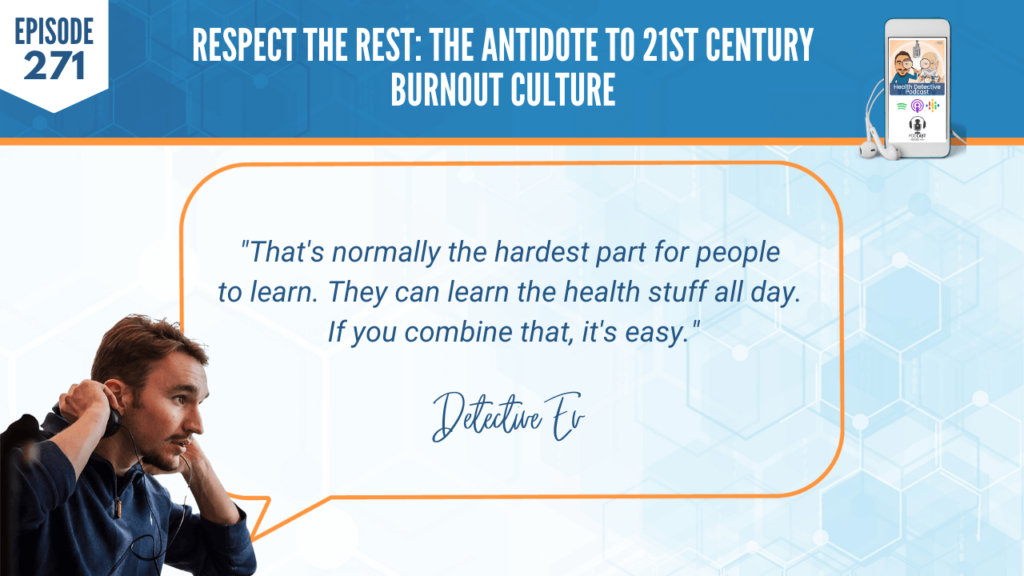
Good news is you have the kind of sales and business background. That’s normally the hardest part for people to learn. They can learn the health stuff all day. If you combine that, it’s easy. There’s no shortage of people who need this. It’ll be exciting to see what does the year from now look like for you.
Is there a specific demographic or niche that you’re focusing on? I know many of us guys will sometimes focus on working with other men. I didn’t know if that’s the case for you. What are you passionate about helping?
Respect the Rest: Athlete Focused
[00:25:21] Scott Shortmeyer: Yeah, that is my intent. I’m not going to say no to people. And especially, back to the beginning, my wife is probably the biggest advocate. There’s her girlfriends and we’ve had conversations and friends. But largely men, 30 to 60 is my demographic to help prevent folks from doing what I did in my 30s. And now I’m not in my 30s. So, there’s different requirements and needs to live a long, healthy life.

And yeah, men, then niching down further as an everyday athlete focused on the health of athletes, working with some, having some conversations with collegiate and professional athletes as well as executive programs.
[00:26:09] Detective Ev: I’m definitely excited. I know we’re getting a little bit ahead, but I’d love to review this in six months to a year and see where you’re at. Because what’s cool about you is I can obviously tell you’re super into this and a smart guy. But there’s something I’ve noticed that obviously we already acknowledge men are sometimes reluctant to this and I think it’s because they don’t relate to it.
What’s cool about you is, good looking dude, healthy looking, and you don’t come across as nerdy as you probably are in the back of your head. I have my moments. I can fake it sometimes. And then I start talking too much. I’m like, oh crap, I got to shut up. And I think where this is really useful is a lot of men, they’re going to relate to someone like you more. Sales leader guy, athlete. Cool, I’ll actually learn from him. And it opens up a conversation that sometimes is very hard to have.
Respect the Rest: Putting it Together
Unfortunately, a lot of men, their first symptom that they ever take care of is a major diagnosis or a heart attack or something happens at work. That should not be the first symptom that men are getting help for. This needs to start much earlier and then we could have a lot better lives.
Same with women, right? There’s plenty of women out there that do the same thing. They’ll push until they get that diagnosis. It’s like holy crap guys, there was stuff going on for years. There’s a decade of half the time a human should be sleeping before things really got out of hand for you, right?
[00:27:21] Scott Shortmeyer: Yeah, 100 percent. The drivers are different for men and women but at the end of the line the issue is similar. You know seeing my wife and friends and you got moms who are mom’s taxi and running all over and maybe have careers as well. So, that’s an intense thing.
And then for the men, yeah, we are definitely reluctant to speak up. We somehow have validated the lone wolf mentality and I’ve got this. And you probably do, but you do need support and collaboration and partnership and an ability to figure out when things are not going well and having the skill to understand or somebody to talk to, to address the indicator lights.
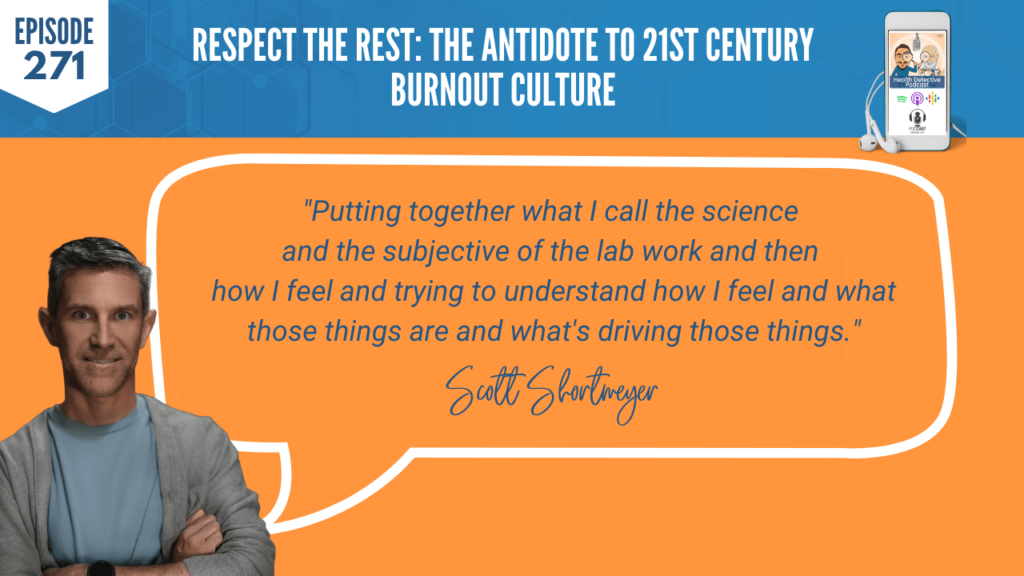
I think it started out the conversation of like just a lacked awareness, right? I didn’t see the red car. So, putting together what I call the science and the subjective of the lab work and then how I feel and trying to understand how I feel and what those things are and what’s driving those things.
Respect the Rest: Neglecting Rest
Eating something and feeling bloated an hour later is not normal, but we’ve normalized it, right? Or whatever, fill in the blank. Or they’re always on. I’m a, like you said, a doer. Wind me up and point in a direction and I’ll go. I think many men are like that, right? It’s just the get-her-done mentality. I’m not shunning the get-her-done or there’s other phrases that probably won’t bear repeating, but the just get-her-done mentality. But you have to account for the rest and all that, right?

I mentioned the podcast and you need hashtags, but #respect the rest. And I think that to me is a cultural issue that we have everywhere that we’ve culturally ignored rest and culturally accepted the 2 AM as a must every single day in order to achieve success and it’s not. Then you throw in all the other stuff like over caffeinate it and blah, blah, blah.
[00:29:25] Detective Ev: Really well said. And the causes of this are multifaceted, right? Because on one end, you have a very practical thing of just speaking for society. At one point, maybe 50 years ago, one income, 40 hours a week could have provided for a family. And generally speaking, that’s hard for a lot of people to do now. So, you have the very practical side of working, not resting, because some people have to.
I’ve been on both ends of this, right? I’ve been in that too, especially in the early twenties. That’s exactly what it was. But there’s a time now where things are going well, and I still find myself in that same thing. So, I think it’s okay to want to be a guy and go achieve things and do this stuff.
Respect the Rest: Limited Number of Hours
Scott Shortmeyer: Absolutely.
Detective Ev: We also do have to sit there and ask the question sometime like, when does this end? When does this become realistic? Is this sustainable over a long period of time?
We have a woman named Jenn Malecha, who is an FDN. Actually, she’s the one who got me into FDN. She’s been doing it for 10 years and she’s very driven, very focused, always been that way. Honestly, she inspires me, and I try my best to apply it to my own life. I’m still working on it, but I always hear like these statements from her.
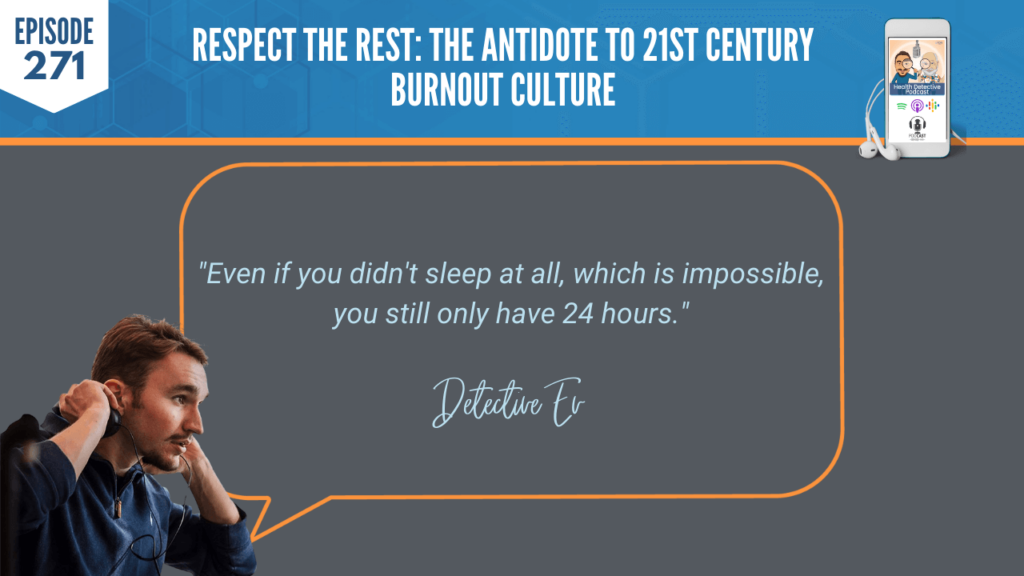
What she does is, obviously, the hours in the day are very limited. Even if you didn’t sleep at all, which is impossible, you still only have 24 hours. She’s an extremely successful businesswoman, and what she realized is I can only add so much more in terms of hours, but I can make myself better and get a lot more efficient. I can learn more, I can learn to delegate certain things. And so, she’s extremely good at focusing on her zone of genius.
I don’t know if she follows this a hundred percent strict a hundred percent of the time, but her claim at least is I’m not working more than 40 hours a week and I’m doing three, two week vacations a year. And you’re like how the heck do you do this? How do you make more money?
I’m going to get better in those 40 hours and act like that’s my 24 hours, right? That’s what’s amazing too. We all do that, especially as guys I saw this.
Respect the Rest: Being More Efficient
And I love him to death. We’ve talked about this. My dad did the same thing. We’ll just keep pushing the hours until there’s no more. Then we forget that we can become more efficient. If you were going to become more efficient at the 16-hour mark, just do it at the 12th. Still get at least four hours of rest, right? Do it at the 10th or the 8th. You can always get more efficient and make those hours that you are doing very useful.
We don’t need to spend more time on that per se, but I just think that’s a really powerful thing. And I say it half the time, just as a reminder to myself that I can only add so many hours, but I can get pretty much unlimited in terms of more efficiency and knowledge at least while I’m here. I can keep learning, reading, studying, and those things can get better.
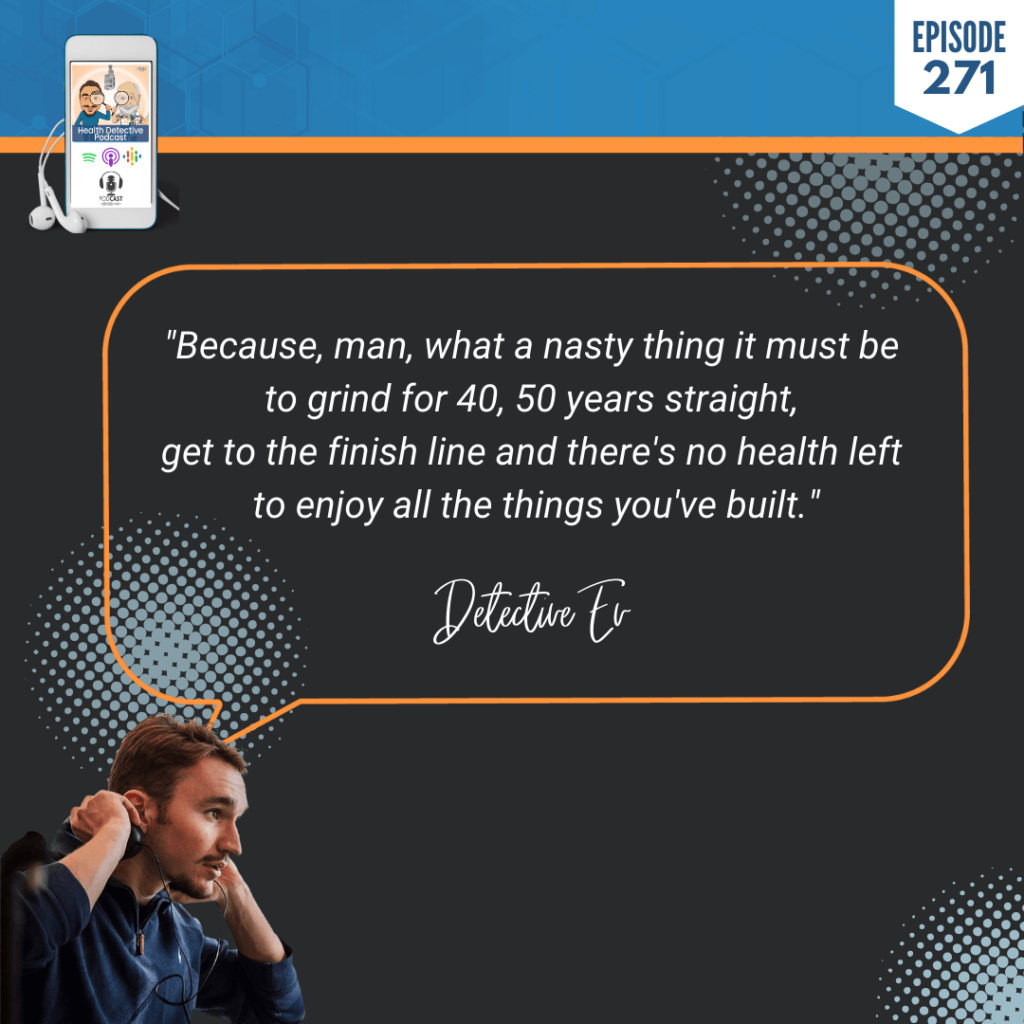
So, you can make all the money, you could still hit the goals, you can have fun, and have a life and health that sustains you for a long period of time. Because, man, what a nasty thing it must be to grind for 40, 50 years straight, get to the finish line and there’s no health left to enjoy all the things you’ve built.
[00:32:15] Scott Shortmeyer: Yeah, and you hear it a lot when people retire not to get morbid. But they retire and within a few years unfortunately pass away. There’s a variety of reasons for that.
Respect the Rest: Contributing Factors
But I think going back to your point there’s a lot of contributing factors to burn out and your underlying why. It’s just really taking a step back and then having that healthy boundary to turn it off.
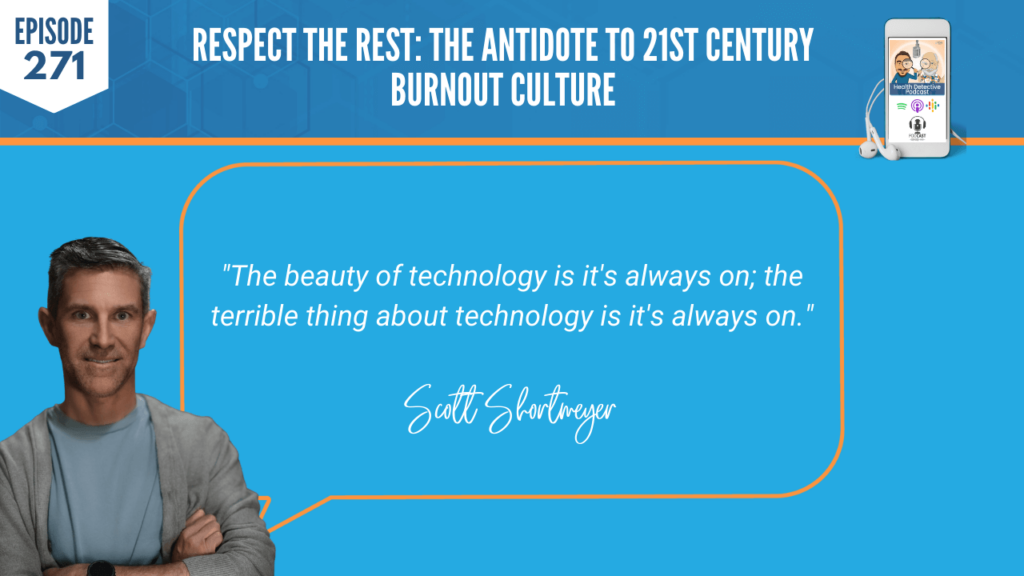
The beauty of technology is it’s always on; the terrible thing about technology is it’s always on.
[00:32:44] Detective Ev: Yeah. We have to be the ones consciously to say, okay, enough is enough. I’m not doing this right now because I can always access it.
And I think that’s really the core of all the issues. You can access work 24/7 now, you can access the TV, whatever. We were made that you can only access stuff roughly you know, depending on where you live, maybe 8 hours to 16 hours a day based on the light. And then you have to go to bed, you got to chill out. But we don’t have that luxury anymore.
With all that said, I want to shout out your podcast and talk about some of the things that you love nerding out on there and what people can expect. I always shout out podcasts on our podcast. The way I look at it is this is a modern form of TV. The reason I compare it to that is because you don’t just watch one TV station or one show. You probably have a lot of things you like. So, I love for other people to explore other podcasts and listen.
Yours is called the Rest and Recovery Podcast, correct me if I’m wrong. And what can they expect to hear on there? What are some of the topics you go over?
Respect the Rest: Foundational Elements of Rest & Recovery
[00:33:36] Scott Shortmeyer: I would say four foundational elements that correlate to rest and recovery, which is sleep, nutrition, mindset, and fitness. To have a lot of experts in all those domains to speak to how to live this one life, that’s the ultimate mission and how to equip people with the awareness, the skill, to be able to rest well and apply it to their lives, whatever is most applicable.

So, I think using that tool of the podcast, to be able to listen and hear experts and how they explain it in their life, and then how you can use it.
[00:34:14] Detective Ev: We have been trying to shift the podcast a little bit in a positive way. Because what we’ve realized after all these episodes is, and I think this is an evolution of the space, just the functional medicine space in general. I think we’re keeping more people, adding people, at not a significant rate.
Honestly, I think there’s like a small percentage of the population that’s really into this. I know people are coming in left and right. It seems like that. But if you go out and walk on the street, you talk to 95 percent of people, they can’t even define functional medicine, let alone tell you what people like us do. It’s still very limited.
All of that to say, I think the people that are here, they’re here to stay and they’re wanting more nerdy topics. They’re wanting to dive a little deeper into stuff.
For our last bit of time here, maybe roughly 10 minutes or so, one of the things clearly that you’re focused on is this rest and recovery aspect. Obviously, that’s the name of the podcast. And we can start with the super fundamental stuff.
Respect the Rest: The Importance of Natural Light
If you’re not even trying to go to bed at 9 or 10 o’clock you’re already shooting yourself in the foot. If you’re waking up to an alarm three hours before you should, again, you’re shooting yourself in the foot. Those are things that you got to work on no matter what. There is no FDN coach out there that can fix that for you, you got to get that down.
However, there are many people, including myself at one point, that are trying to do the best that they can with the sleep. They’re like, I’m going to bed on time, and I still wake up and I don’t feel good.
So, as you are starting to work with people more and more, I’m sure you’re going to be doing the FDN foundational stuff. That’s fantastic. What are some of the more advanced things maybe you’ve learned in terms of rest and recovery that the average person just might not have ever heard of and they can walk away with today and not just say, all right, I need to get eight hours. I get that. But maybe some hacks or something that can help them along the way.
[00:36:02] Scott Shortmeyer: Yeah. There’s a spectrum of options out there from zero costs to pretty expensive.
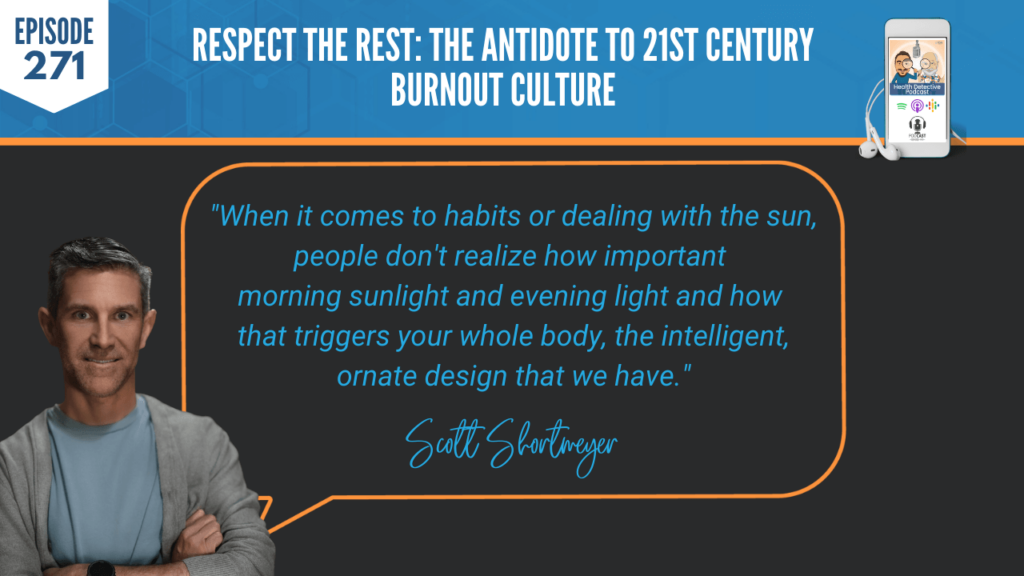
I think some of the simple ones that people overlook because it just seems remedial, but it’s so important is light. I say bookend your day. When it comes to habits or dealing with the sun, people don’t realize how important morning sunlight and evening light and how that triggers your whole body, the intelligent, ornate design that we have.
Respect the Rest: Designed to Work with Nature

I’m a Christian, so I believe we’re designed by God, a pretty smart guy, I would think, who set this up in giving us nature to work with our body in our circadian rhythm. How important things like grounding is to help with our nervous system getting us regulated properly so we can have that rhythm throughout the day to be more effective throughout the day and then when it’s time, more effective at powering down and going to sleep.
[00:37:09] Detective Ev: You mentioned around the middle of the show about some things are actually very straightforward, despite how complex they can get. And it is hilarious, right? The straightforward part of this is, get outside in the morning, get outside at night. Okay. You don’t need to read anything; you don’t need to do anything else. Just do those things. It’s as natural as can be and it will work out for you.
In fact, the morning light routine was the only thing ever that fixed the sleep cycle for me. I always had issues with that. Even eating well, doing all the supplements, it was a pain in the butt for me trying to fix that. And after about a month of doing it, I was good to go. I could effortlessly go to bed at 10, wake up at six and I’ve never looked back since.
We could give a whole podcast on this easily, but for those that might be either newer to the whole light thing, especially the morning light, or maybe they’ve heard it, but it almost seems too simple. They’re like, no way this can be that big of a deal.
Respect the Rest: Resetting our Rhythms
You just mentioned this is one of the most important things to you. And I would second that. I always talk about this. What’s the science behind that? Why do we have to get out in the morning even if we have busy lives, kids, work? So, why do we have to prioritize that?
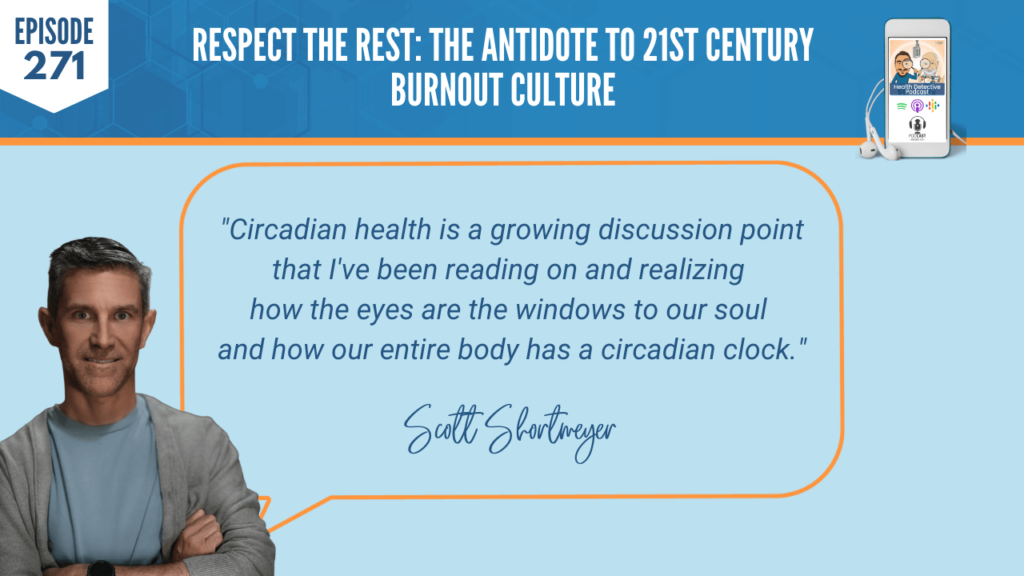
[00:38:35] Scott Shortmeyer: Yeah. Circadian health is a growing discussion point that I’ve been reading on and realizing how the eyes are the windows to our soul and how our entire body has a circadian clock. Each thing relies on that and the importance of the light as being that trigger point.
Getting out into the light and getting the body to start functioning as it ought to, it has that innate intelligence to operate in a certain way. And our modern lifestyle gets it out of whack. That’s a good way to reset or reclaim our rhythms and get the body in it.
I’ve got a client, before I had the FDN, was doing some sleep coaching, and that was one of the things that helped him as well. He had terrible insomnia. Every morning would go and do that, and it worked significantly for him in really helping his health overall.
[00:39:12] Detective Ev: Nice. I actually say the same thing to clients because many of them, their sleep’s not great. Certainly, they’re not ready to wake up at sunrise, especially if it’s in the summer. They’re like, that’s 5:40 AM. Do you understand that? And I’m like, yes, I do.
I always say, have you ever woken up to an alarm you didn’t want to wake up to before? They’re like, oh yeah, I pretty much do that every day anyway. I say, perfect.
Respect the Rest: Entrained with the Light
So, what we were going to do is we’re going to set that alarm for right around sunrise, like five minutes before. You get out, just go out for 20, 30 minutes, it’s all I’m asking, no glasses, no sunglasses. Then you can come back in and sleep, I don’t care.
Actually, this is something I just came up with – that whole going back to sleep part – because I figured it wouldn’t matter long term. And I’ve seen a hundred percent success rate with this within a month. It does take up to 30 days for some. But when these people do this, even if they come back in after the 30 minutes and need to sleep, really, it’s just a nap at that point.

What happens is their circadian rhythm starts becoming entrained with the light. And then all of a sudden, almost universally, they have this day, roughly two weeks in where they’re like, hey man, I woke up without the alarm today, and I didn’t need the nap, and I went to bed on time.
The body was made for this, guys. So, when you give it a chance to do this, that’s just how it works. It’s like when we eat real food and we feel fantastic, that’s not something so profound. We’re just doing what we were supposed to be doing and feeling how we were supposed to feel.
So, are you blocking the blue light at night? Are you fully into this then?
[00:40:30] Scott Shortmeyer: Yeah. I was just going to go there.
Respect the Rest: Overdosing of Blue Light
Some relatively inexpensive ways to help with that is the overdosing of blue light is what I call it.
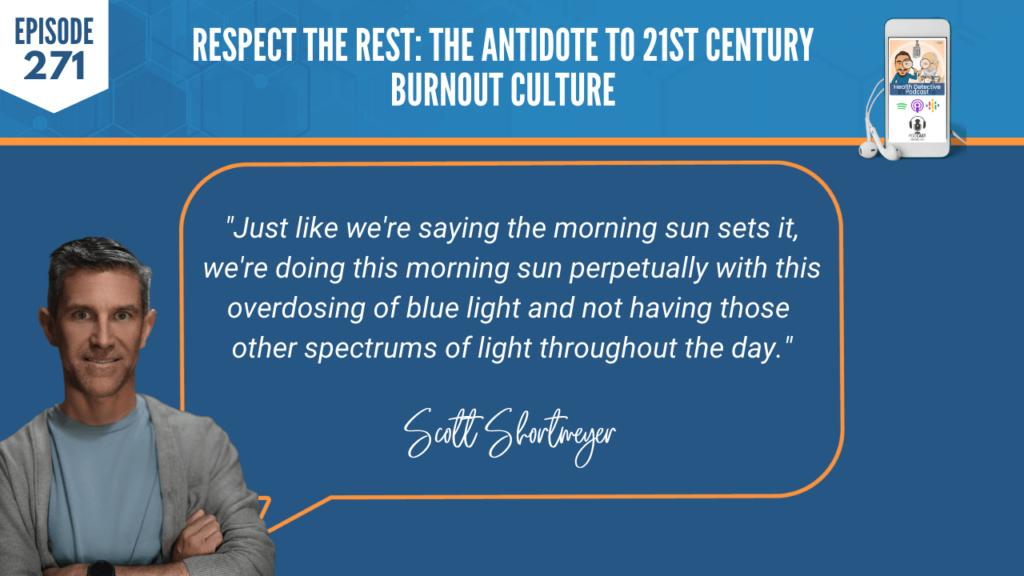
We’re staring at these screens, our phones, computers all day and it’s constantly triggering our brains to think it’s noon. That’s the negative about it. Just like we’re saying the morning sun sets it, we’re doing this morning sun perpetually with this overdosing of blue light and not having those other spectrums of light throughout the day.
So, a good way to mitigate that is blue blocking glasses. There’s a company called Wave Blocker. Sorry, that was for EMF. EyeJust is what I use, screen protectors. You can put it on your device. I got both. And I recommend it to a lot of people just because it’s a simple passive way. It’s inexpensive. And it’s just that, to me, pennies add up to dollars. Over time you do a couple little things that are relatively inexpensive and that is going to compound over time positively.
[00:41:30] Detective Ev: It’s a shame that, not really in our space, I think most people are open to it, but the general public, some of this stuff can oftentimes look so extreme. Not so much the sunrise thing but the second I start talking about blue light blocking glasses, this is still weird.
And I first learned about this six years ago when I was just applying anything I learned at the time. Then there’s people that were on it way before that. It’s a shame that it sounds extreme because when you look at it, this is as natural as possible, not wearing the glasses, but blocking certain parts of the light spectrum at night. That’s why we call it night. It’s dark, there’s no more light. And we invented stuff.
Respect the Rest: No Sunglasses
My favorite quote by Dr. Jack Cruz is that human beings are the only animals smart enough to invent artificial light and dumb enough to live under it. It is amazing. What an interesting thing to be smart enough to do this. Then we’re like, oh, let’s live under it 24/7. It’s wow, digging our own grave.
[00:42:22] Scott Shortmeyer: Yeah. And to piggyback off that, like the culture thing and talking glasses, the other side of that, and I think Dr. Jack talks about it, is stop wearing sunglasses. You say that and people are like, what are you talking about?

It’s just like, you wear sunglasses that block the sun. No, if you don’t wear sunglasses, your eyes adapt. So, when you’re wearing the sunglasses, you’re creating, I’ll call it a deficiency, that’s not the right term, for your eyes to adjust to the natural light and to work with the natural order of the circadian rhythm.
[00:42:57] Detective Ev: Yes. That one even meets resistance in the functional space. Again, those people are normally open to the blue blockers. Even if they don’t do it, they’re like, okay, I respect you. I get it. I would do anything for my health too, if I felt that I needed it.
The sunglass one, people can’t get over the whole style or whatever. But it was hilarious because six years ago, I ditched the sunglasses and I put on blue blockers. It’s very interesting, especially when you’re in your family that might not be. I was living with my parents at the time, I was like 21. It just looked so odd.
Respect the Rest: Signals Through Your Eyes
Wait a second, so you take off your glasses during the day now and you put them on at night. Obviously, they’re not sunglasses, but you know what I mean? And the answer was yes.
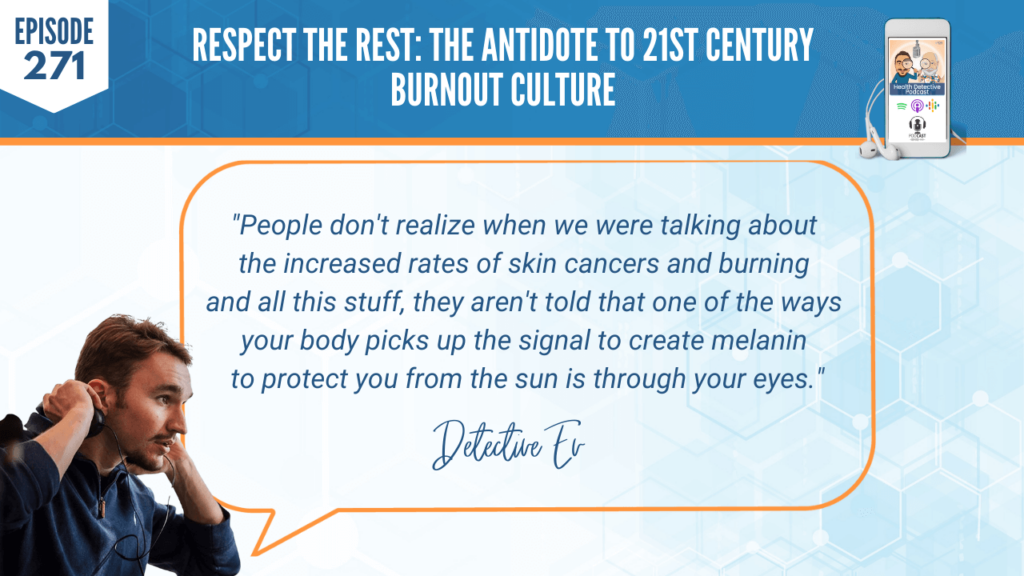
People don’t realize when we were talking about the increased rates of skin cancers and burning and all this stuff, they aren’t told that one of the ways your body picks up the signal to create melanin to protect you from the sun is through your eyes.
Scott Shortmeyer: Yep.
Detective Ev: It’s fascinating when you realize how simple that is.
The other thing too is I hear all these people thinking about, my eyes are so sensitive. The first thing I say with that, I’m like, if your eyes are sensitive enough that you’re bothered outside, how did you think you were going to make it through life if we just never invented sunglasses? How did your ancestors make it here? Do you not think that there’s something wrong with that?
[00:44:07] Scott Shortmeyer: Yeah, that should be the indicator light on the dashboard saying something is off.
[00:44:12] Detective Ev: Yes, I have also found people rejoice in this, I think, 100 percent success rate with that sensitivity eventually going away.
If you guys are interested in that, what you start with is exactly what Scott recommended. You start with the morning light, right? Tell your body what time it is. Let those eyes get adjusted. You finish with the sunset; you get outside as much as you can. Expose yourself to actual light. I’m not saying cause yourself pain, don’t be stupid. But you want to progressively work towards not needing these sunglasses.
Respect the Rest: A Game Changer
I know what people mean when they say the sensitivity thing, because that would have happened to me years ago. But it’s been so long now, it’s amazing to me when I’m standing outside with someone that is actually complaining because of how bright it is. I’m like, dude, I’m not thinking about this at all. It wouldn’t even register.
And I can’t help but think that I’m not only this arrogant, but I’d have to think we’re the correct ones here because we weren’t born with a pair of sunglasses when we came out of our mothers. So, I’m going to guess that maybe we weren’t naturally supposed to have those, and we should be able to see outdoors. Radical idea, I know, but to me that just makes sense.

So, I appreciate you nerding out with me on that. I’m sure we could talk about light forever. It’s cool to me always when someone brings that up as the first thing when I talk about what’s something really important to you because it is for me. It was a game changer. My health would not be the same without it.
And I’ve taken it, this really is extreme, the thing that I did that I’m actually most proud of with the light stuff in the same way is in the beginning of the pandemic, I camped for 60 days. And I wasn’t living outside all day. I went in and worked. But even when I worked, I had the computer set up at the window. I wanted to know how good can I feel when I am outside all the time.
Respect the Rest: Modifying Needed Sleep
And there were seven nights that I missed due to lightning storms. I figured not a great experiment if I die. There’s 53 days that I actually got to do that. At first it was a little uncomfortable, right? Your body getting used to this, I’d never camped before. I went from no camping to camping for 60 days straight. And so, it was weird.
Then once I adjusted, the biggest thing that was crazy to me, I needed about maybe two hours less sleep outside than I did inside, and I felt better. I think that was just because of the light, right? Because grant you, it was summer. So, I’m sure this wouldn’t always be the case.
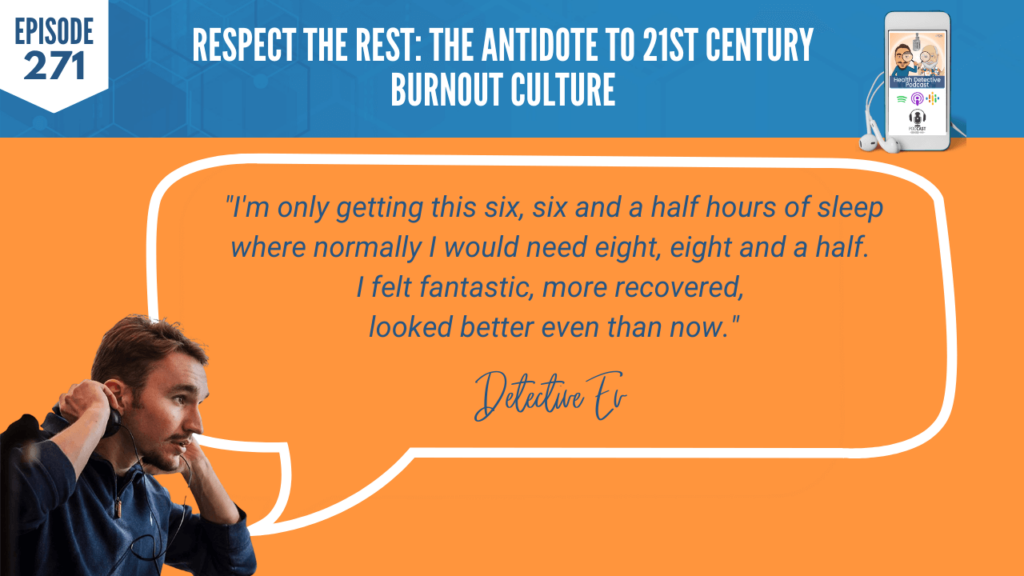
But it wasn’t really dark until 9:40 here. And the first light’s coming up at 4:50. So, I’m only getting this six, six and a half hours of sleep where normally I would need eight, eight and a half. I felt fantastic, more recovered, looked better even than now. I just, I did, I looked healthier. And this is what we were supposed to do naturally. I did it for 60 days and I feel the best I ever have in my 20 something years on this earth.
[00:46:44] Scott Shortmeyer: That’s an awesome testimony. It’d be interesting if you had wearable data to see the different splits on sleep with REM and deep sleep and how quality that was. It probably was high if you were waking up, rested, the quality of sleep.
Where to Find Scott Shortmeyer
[00:46:58] Detective Ev: Listen, Scott, I always talk about my highs and lows, so I’m thankfully doing very well right now. Everything worked out.
But the funniest part is I ran labs before I did the experiment. I never ended up running the same labs afterwards because I was just broke during the pandemic. Like I was speaking at schools for a nonprofit beforehand. I went from like, all right, this is going well to, wow, this sucks. So, failed experiment in that sense, but subjectively and anecdotally, it went pretty well.
Maybe we’ll give it another try if my parents are willing to have me move back again to go camp in their backyard. That was an interesting one to explain to my dad. He said, yeah, you’re allowed to move back, but why exactly? To sleep in our backyard? That was a foreign concept to him.
So, Scott, with that said, obviously you’re on the market, you’re helping people, they can now work with you. Where can they find the podcast or contact you? And then obviously if they wanted to work with you, what’s the process there?
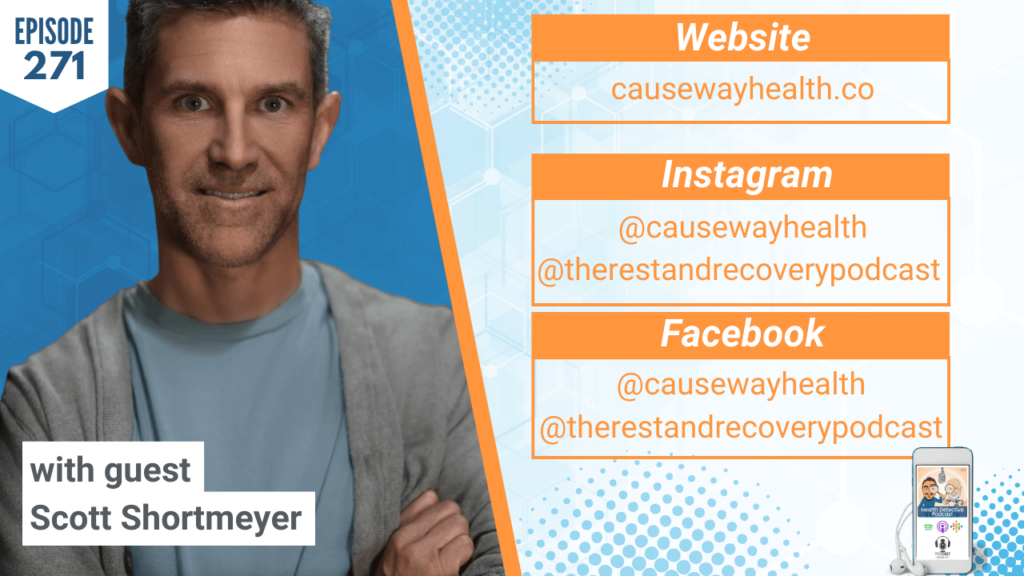
[00:47:44] Scott Shortmeyer: The podcast is the Rest and Recovery Podcast on all the different channels. Website is berestedbewell.com. And then my functional health practice is called Causeway Health – bridge to a better you. That website is causewayhealth.co. You can find me there.
Conclusion
[00:48:01] Detective Ev: Sweet. Scott, thank you so much for coming on.
Seriously, if you remember six months, one year down the line, I think you’re probably going to be someone that just takes this and runs with it. I have a very strong feeling about that. So, I’d love to see where you’re at and how that’s working. It’s always great to talk to another guy who’s doing this because everyone has health issues. we need more men in the space helping other guys.
[00:48:19] Scott Shortmeyer: Absolutely. Evan, I really appreciate the opportunity to be here, man. And I’d love to take you up on that.
You can always visit us at functionaldiagnosticnutrition.com, on YouTube @FDNtraining, on Instagram @fdntraining, or on Facebook @FunctionalDiagnosticNutrition.
For more informational and functional health-oriented podcasts like this one, go to functionaldiagnosticnutrition.com/health-detective-podcast/.
To learn more about us, go to functionaldiagnosticnutrition.com/about-fdn-functional-testing/.

